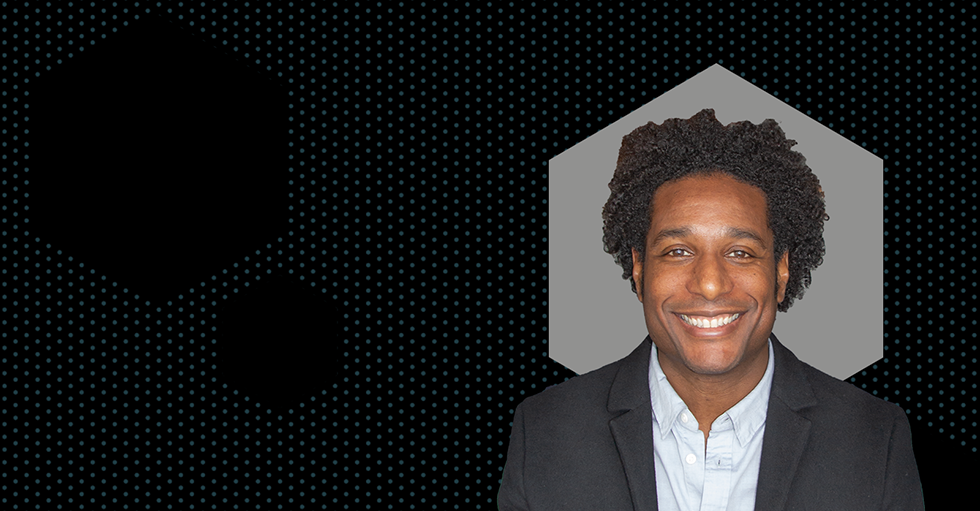Meet a Dragon: Marc Carmichael, PhD

On leave from Stanford University’s M.D. program, Komodo Health’s Senior Clinical Expert, Marc Carmichael, PhD, recounts how his professional journey is inextricably linked with his personal mission to build a more equitable -- and healthy -- world.
Tell me about your background and what brought you to Komodo Health.
Right now, I’m on a leave of absence from Stanford University School of Medicine so that I can work here at Komodo Health. Before coming out west for medical school, I earned my Ph.D. in Biomedical Engineering and previously worked as both a Chemical and Process Engineer in the R&D divisions at Centocor and Merck & Co. I have a background in translational research, technology development, and biopharmaceuticals.
I’ve always been drawn to work that could have a transformative impact on people’s lives. In medicine, I’m particularly drawn to help people suffering from conditions that have no cure. This desire to help people most in need is what drew me to Komodo. The company’s mission is in line with mine, and I believe in the promise of big data for enabling us to reduce the global burden of disease.
I will go back to Stanford next year to finish up the M.D. program and plan to apply for residency in neurosurgery. I see my time at Komodo as a fellowship in applying big data to address unmet needs in healthcare. I feel like I’m making a measurable impact on disease burden in my current role, and I look forward to applying all that I’ve learned to help patients throughout my career.
How do you see Healthtech changing the medical landscape in the future?
As the COVID-19 pandemic has recently revealed to everyone, accurate and timely knowledge of disease burden is required to reduce the negative impact a disease can have on us. This isn’t limited to viral infections -- it also applies to other conditions like chronic or rare diseases and cancers that can be treated if the appropriate diagnostic is performed. This underscores the need for accurate and timely health data that can provide us with actionable insights into our healthcare system. Insights that can be used to get the right treatments to the right patients at the right time.
For example, we often get requests from companies with a drug that has the potential to help patients with a particular disease, but they don’t know where to find the doctors treating these patients. We can look into our data to help these companies find doctors treating patients who could benefit from their therapy. These patients could be kids who might not get the drug otherwise and these kids might not survive if we didn’t have the ability to pass along actionable insights to those who could help them. Healthtech has the opportunity to make the entire healthcare system more efficient and equitable. That’s the promise -- and it’s also the challenge.
When it comes to health data, we’re in this “wild, wild west” and Komodo could not only set the standard for how to use this data, but also to use it for good. To improve the quality of life for patients with rare or under-resourced diseases. To improve our healthcare system. Komodo is making real contributions to using data for good. That’s why I’m here.
I see you are involved in various teaching, mentoring, and service activities within your local community.
Over the years, I’ve realized that I have a strong desire to translate what I’ve learned into ways that can directly help people.
I think all of our kids have similar dreams regardless of their background or socioeconomic status, but some get early exposure to information and opportunities that will help them fulfill their dreams -- and many don’t. I believe in the value of exposing everyone, especially children, to the opportunities they have to thrive and develop their natural talents to fulfill their dreams. This is why I’ve remained involved in mentoring and volunteering in my local community through all the stages of my training. I’m a firm believer of “each one, teach one” and “lifting as you climb.”
Like many of the mentors I’ve encountered along the way, I try to make things more equitable by helping children with fewer resources understand the value of their abilities, passions, and where they can thrive and add value. Most recently I’ve volunteered with the Physicians Medical Forum, a non-profit organization of African-American doctors in the East Bay Area working to eliminate disparities in healthcare and access to higher education, while increasing the number of underrepresented physicians who come from similar backgrounds as the patients they serve.
Tell me about your involvement with East Palo Alto Academy.
There’s a huge disparity between the “haves” and “have-nots” in the Bay Area. For instance, Palo Alto and East Palo Alto are right across the highway from each other, but they have completely different cultural and economic demographics -- and school systems. During my first year of medical school, I started a program at East Palo Alto Academy to help mentor kids and make the science curriculum more accessible to them. This program still exists today and continues to connect Stanford medical students with students from East Palo Alto Academy. I’m pleased that I was able to create a sustainable link between their community and the resources at Stanford.
Work, medical school, volunteering, mentoring: How do you balance all this?
I’m convinced that true balance at this stage of one’s career might be a myth. I believe in juggling: I have a system in which I regularly prioritize and reprioritize to maximize what I’m able to contribute in a given day, week, or month. So I juggle, and I’ve gotten better and better at it over the years.
Tell us something about you that most people don’t know?
I’m really an artist at my core. I used to play drums in an alt rock band, and Mitch Mitchell from the Jimi Hendrix Experience is one of my favorite drummers. I grew up on Hip Hop though, and it remains close to my heart. I also used to produce for local rap artists in New York and New Jersey, and although I left most of my music equipment back east, I’ve been feeling the itch to produce again and seeing how spending recent years in California has impacted my sound.
Anything else you want people to know?
Komodo is a great place to work. There are a ton of smart, mission-driven folks at this company. I feel like we’re a team driven to do more than enrich ourselves with our talents; there’s a genuine sense that everyone has a strong desire to improve the world around us. That’s what I like about the company. That’s why I’m here.





